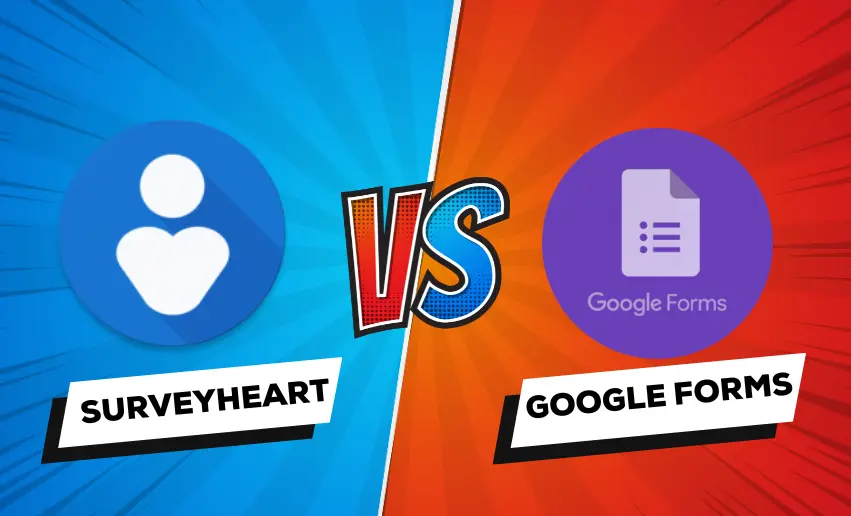Surveys have become an invaluable tool for businesses, organizations, and individuals alike, offering a powerful means to gather valuable data and insights. When it comes to survey creation and data collection, two popular options often come to mind: SurveyHeart and Google Forms. Both platforms offer robust features and user-friendly interfaces, making them go-to choices for many survey enthusiasts. But how do these tools stack up against each other?
In this blog post, we will dive deep into the world of survey tools SurveyHeart vs. Google Forms. The major difference between Google Forms and SurveyHeart lies in their respective functionalities. Google Forms excels in handling forms, whereas SurveyHeart is tailored toward surveys. This subtle contrast, although lacking a standardized definition, carries significance.
SurveyHeart vs. Google Forms: Other Differences
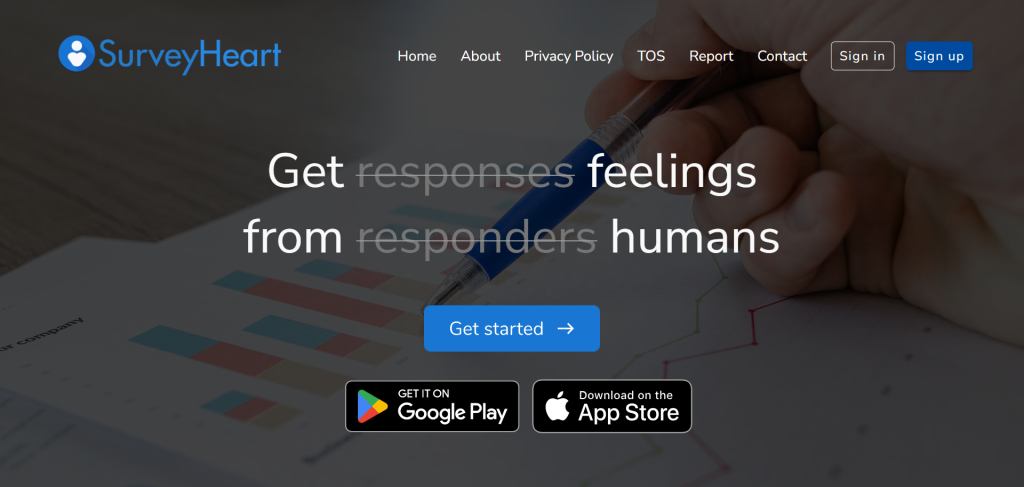
Generally speaking, forms are designed to gather specific data, such as purchase orders or event registrations, while surveys are intended to capture detailed feedback or opinions. Whether you’re a market researcher, a student conducting a study, or someone looking to gather opinions, this comprehensive analysis will help you decide which platform best suits your survey needs.
1. User interface and Design options
SurveyHeart provides users with a range of customization options to enhance the visual appeal of their surveys. Users can choose from various pre-designed survey templates, each offering a different aesthetic and layout. Additionally, SurveyHeart allows customization of the survey theme, including color schemes, fonts, and logos, to align with brand identity or personal preferences.
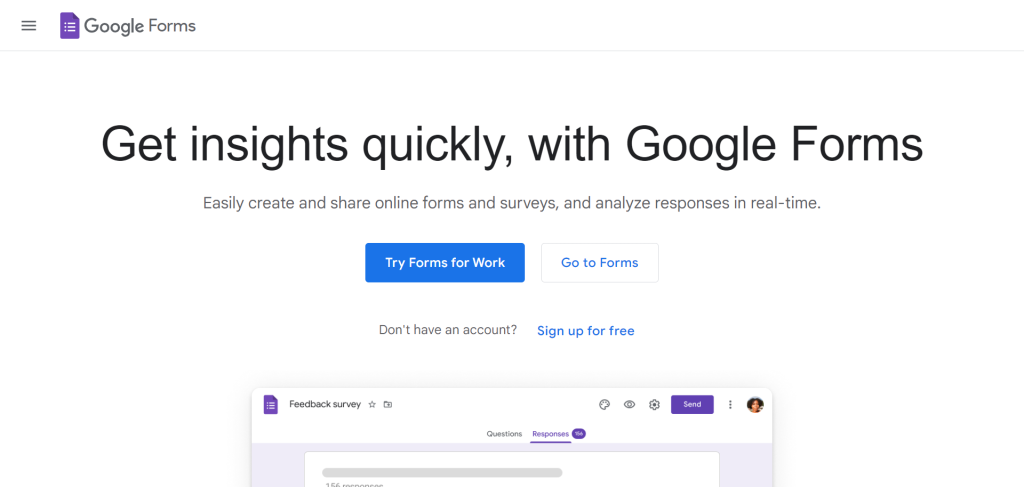
Google Forms also offers customization features, although they are slightly more limited compared to SurveyHeart. Users can select from a collection of pre-designed themes or opt for a plain, minimalistic look. While the customization options may not be as extensive as SurveyHeart, Google Forms provides essential tools to modify the header image, color palette, and font styles.
2. Question types and Survey options
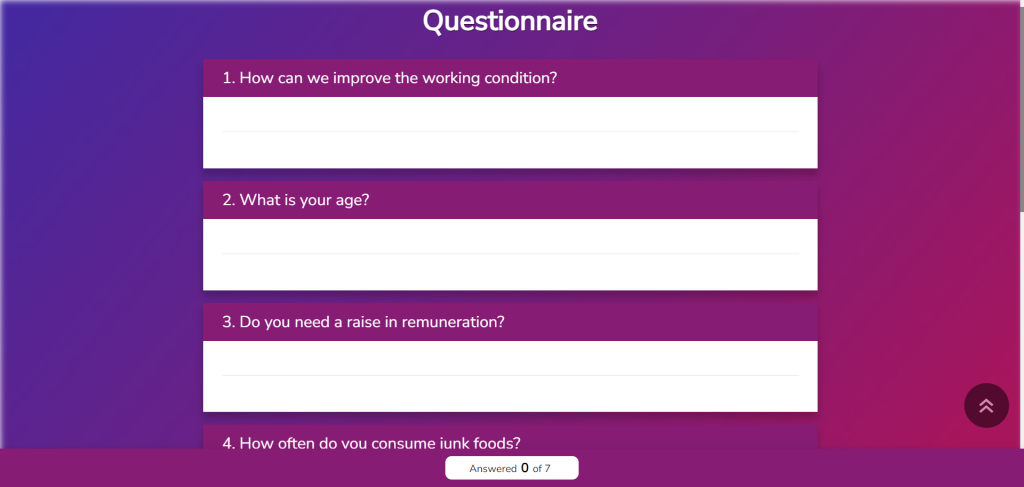
SurveyHeart boasts diverse question types, enabling users to gather specific and comprehensive data. Users can choose from multiple-choice, rating scale, open-ended, matrix, and Likert scale questions. This extensive array of question types facilitates in-depth survey designs that cater to diverse research objectives or data collection needs. SurveyHeart’s versatility in question types ensures high precision and flexibility in survey creation.
Google Forms also offers a solid selection of question types to support survey creation. Users can utilize multiple-choice, checkbox, dropdown, linear scale, and text entry questions to gather insights. While the available question types in Google Forms are not as extensive as in SurveyHeart, they cover the essential needs of most surveys. The simplicity of the question types offered by Google Forms makes it a user-friendly choice for those seeking straightforward survey options.
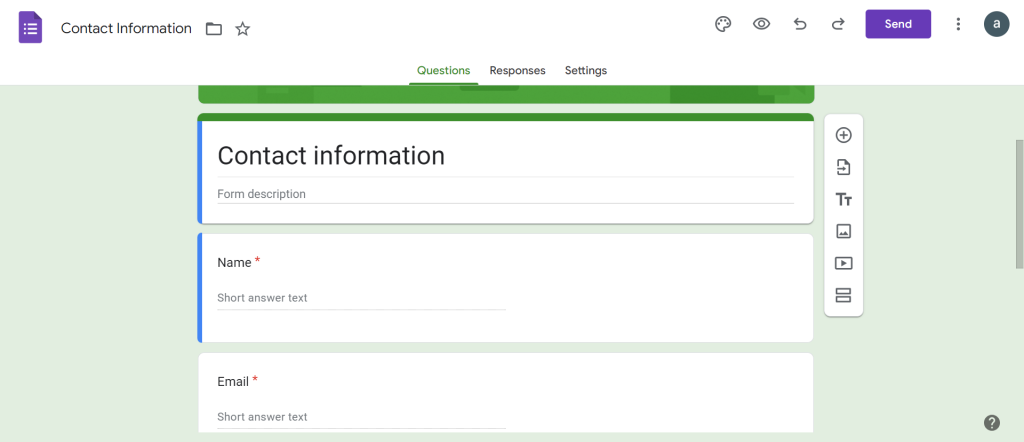
3. Data Collection and Analysis
SurveyHeart provides robust data export and reporting features that facilitate comprehensive analysis. Users can export survey responses in various formats, including CSV, Excel, and PDF, allowing for seamless integration with external analysis tools. Additionally, SurveyHeart offers real-time analytics and customizable reports, enabling users to visualize data trends, identify patterns, and gain valuable insights.
Google Forms also offers convenient data export options, allowing users to export survey responses in CSV or Google Sheets formats. While the reporting features in Google Forms are more basic compared to SurveyHeart, users can still generate summary statistics and basic visualizations within the platform. Google Forms seamlessly integrates with Google Drive, enabling easy storage and sharing of survey data.
4. Collaboration and sharing capabilities
SurveyHeart offers robust collaboration features that facilitate teamwork and seamless survey creation. Users can invite collaborators, granting them various levels of access, such as editing or viewing rights. This allows for efficient collaboration among team members, enabling multiple individuals to work on surveys simultaneously. Furthermore, SurveyHeart provides a commenting system, enabling real-time discussions and feedback exchange within the platform. These collaboration features make SurveyHeart an ideal choice for research teams or organizations requiring collaborative survey creation.
Google Forms also provides collaboration features that promote teamwork and shared survey development. Users can invite collaborators by sharing the survey link or granting them access via their Google accounts. Collaborators can contribute to survey design, view responses, and even edit the survey content. Google Forms offers real-time collaboration, allowing team members to work together seamlessly. While not as extensive as SurveyHeart’s collaboration features, Google Forms still enables efficient collaboration for smaller teams or individuals working on surveys.
5. Price
The pricing models for these platforms differ significantly. Google Forms is widely known for its free availability, making it an attractive option for budget-conscious users. For individual users, Google Forms is available free of charge and includes 15 GB of storage per user.
However, it’s important to note that Google Forms is also offered as part of the comprehensive Google Workspace package, which does come with a cost. Organizations or businesses looking for the complete suite of Google productivity tools may opt for the paid Google Workspace package to access enhanced features and additional storage options.
On the other hand, SurveyHeart also offers free usage for surveys. There are no paid services and all the features present are available to all users.
Conclusion
Choosing between SurveyHeart and Google Forms ultimately depends on your specific survey needs and requirements. Google Forms is a solid choice if you’re looking for a user-friendly and cost-effective solution for basic surveys. However, if you require advanced customization, complex question types, and in-depth data analysis, SurveyHeart may be the better fit. By experimenting with both tools, you can assess how well they align with your survey needs and determine which suits your preferences, budget, and desired outcomes better.


